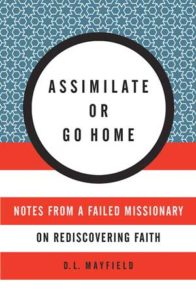Assimilate or Go Home: Notes from a Failed Missionary on Rediscovering Faith
Reviewed by Brent Bill
March 1, 2017
 By D. L. Mayfield. HarperOne, 2016. 224 pages. $14.99/paperback; $9.99/eBook.
By D. L. Mayfield. HarperOne, 2016. 224 pages. $14.99/paperback; $9.99/eBook.
[Buy on Quakerbooks]
I grew up an Evangelical Friend. Despite sitting through countless missionary presentations, I, unlike D. L. Mayfield, had no interest in becoming a missionary. In fact, when everyone else in the congregation was singing “I’ll go where you want me to go, dear Lord,” I was adding, under my breath, “Not to Africa, I won’t.”
I suspect that I’m not the only Quaker who cringes at the word missionary—though I have great respect for friends and Friends who have served in Friends missions from Jamaica to Cuba to Ramallah to Kenya and beyond.
So why was I interested in reviewing this book and think it would be of interest to Friends? For one, it was because Mayfield’s “mission field” was close to her home and not overseas or across borders. Certainly our meetings have a “mission” in the local travel where we are geographically located. At least, we should have such a ministry.
Second, Mayfield admits that she’s a “failed missionary.” I find I often learn more from those who see themselves as having failed than from those who think they have succeeded in ministry. And it seems to me that many of our meetings are failing in our mission/ministry to our community. We profess to love our communities but are much like Linus from Peanuts when he said, “I love mankind; it’s people I can’t stand.” We love our communities; it’s our neighbors we can’t reach. Just yesterday I was visiting a Friends meeting and a longtime member said, “We need to attract more people like us.” That’s part of the problem—people like us are who we want to reach, but they’re not who we’re called to reach.
Mayfield’s book is helpful in showing us some more possible reasons why the Religious Society of Friends in the United States and Canada is not the diverse, inclusive community of faith we say we wish it to be. For one, this “attracting people like us” idea keeps us from seeing the worth of the “other.” The other being those who are not like us and to whom we sometimes reach out, if at all, from a position of superiority and condescension.
Assimilate or Go Home is also helpful in showing us how to learn more about those who are “other.” In Mayfield’s case, she gives examples of her own learning from working with people who are Somali Bantu refugees. She shares all sorts of reasons why they don’t—or even can’t—“assimilate” in the ways that a majority privileged white population expects them to. Why they don’t become “like us.” This includes everything from refugee trauma inducing learning disabilities to “our” American experience not being “their” American experience. Our normal is not their normal.
We can look at and learn from Mayfield’s failings and perhaps see our own with fresh eyes. She never adopts the “expert” tone. Instead, through her stories, she nudges us gently to consider our own. How do we embrace and include the other in our communities—not as target markets but as real, fully loved children of God? How do we, to rephrase George Fox a bit, become “patterns and examples in all countries, places, islands, nations, and neighborhoods wherever we are; that our carriage and life preach among all sorts of people, and to them”? And to continue that thought, “then you will come to walk cheerfully over the world answering that of God in everyone; whereby in them you may be a blessing, and make the witness of God in them to bless you.”
Ah, would that our meetings be blessings—and not something driven by and ignored.
Mayfield’s book, for certain, may require a kind of translation. In my own case I found myself substituting “Quaker college” when she refers to “Bible college,” “Quaker” for “Christian,” “meeting” for “church” or “congregation.” Such translation helped me take off my Quaker exceptionalism lens and see more clearly the failings of my own meeting in reaching out to the increasing number of Myanmar refugees and Hispanic residents in our township. We have had good intentions, but we all know what the road to perdition is paved with.
Friends and meetings who are serious about being patterns and examples and answering that of God in the other need to read this book. It will make them uncomfortable. It will challenge assumptions. It will shake them up, as did the early Friends to the good, comfortable people of their day. Instead of “assimilate or go home,” we have to become helpful or get out of the way.



Comments on Friendsjournal.org may be used in the Forum of the print magazine and may be edited for length and clarity.